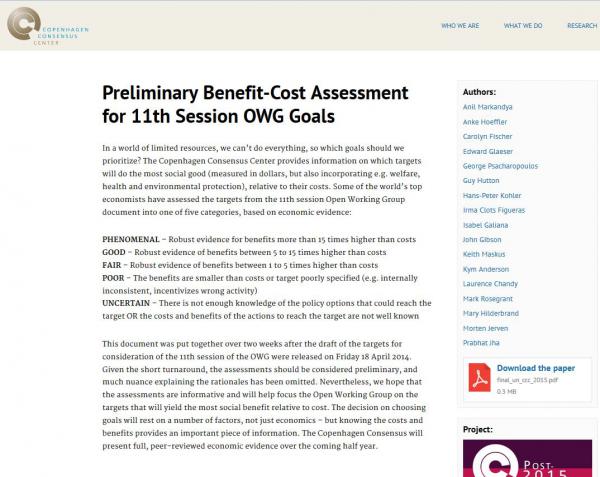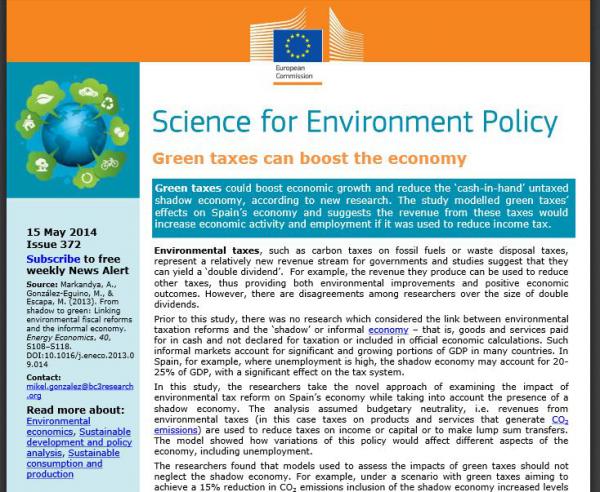A partir de Enero de 2016 todas las Noticias de BC3 estarán disponibles en news.bc3research.org.
Las Noticias anteriores a Enero 2016 se muestrran a continuación
BC3 en los medios
Preliminary Benefit-Cost Assessment for 11th Session OWG Goals
Thursday, 05 de June de 2014
Some of the world’s top economists, among which it is Prof. Anil Markandya, Scientific Director of BC3, Basque Centre for Climate Change, have assessed the targets from the 11th session Open Working Group document into one of five categories, based on economic evidence: Phenomenal, Good, Fair, Poor and Uncertain.

Media coverage of this news. The New York Times
FLAGSHIP project just launched its bi-annual Newsletter
Wednesday, 04 de June de 2014
FLAGSHIP (Forward Looking Analysis of Grand Societal challenges and Innovative Policies) project has just released its Bi-annual Newsletter Flagship newsletter3 june14.
More information about this project and BC3´s contribution here
The European Commission selects a BC3 research for its quality and policy relevance
Friday, 16 de May de 2014
The European Commission´s "Science for Environment Policy" weekly News alert selected in its latest bulletin, for quality and European policy relevance, a paper co-authored by BC3 researchers, Prof Anil Markandya and Dr. Mikel-Gonzalez de Eguino;"From shadow to green: Linking environmental fiscal reforms and the informal economy"and published in the prestigious scientific journal Energy Economics (DOI:10.1016/j.eneco.2013.0).
This weekly News Alert forms the cornerstone of the Science for Environment Policy service of the European Commission and summarises scientific studies in easy-to-read language with policy implications clearly highlighted. The studies are carefully selected for quality and European policy relevance.
Green taxes can boost the economy
Green taxes could boost economic growth and reduce the 'cash-in-hand' untaxed shadow economy, according to new research. The study modelled green taxes' effects on Spain's economy and suggests the revenue from these taxes would increase economic activity and employment if it was used to reduce income tax.
[http://ec.europa.eu/environment/integration/research/newsalert/newsalert.htm ]

[http://ec.europa.eu/environment/integration/research/newsalert/pdf/372na4.pdf]
Environmental taxes, such as carbon taxes on fossil fuels or waste disposal taxes,represent a relatively new revenue stream for governments and studies suggest that they can yield a ‘double dividend’. For example, the revenue they produce can be used to reduce other taxes, thus providing both environmental improvements and positive economic outcomes. However, there are disagreements among researchers over the size of double dividends.Prior to this study, there was no research which considered the link between environmental taxation reforms and the ‘shadow’ or informal economy that is, goods and services paid for in cash and not declared for taxation or included in official economic calculations. Such informal markets account for significant and growing portions of GDP in many countries. InSpain, for example, where unemployment is high, the shadow economy may account for 20-25% of GDP, with a significant effect on the tax system.
In this study, the researchers take the novel approach of examining the impact of environmental tax reform on Spain’s economy while taking into account the presence of a shadow economy. The analysis assumed budgetary neutrality, i.e. revenues from
environmental taxes (in this case taxes on products and services that generate CO2emissions) are used to reduce taxes on income or capital or to make lump sum transfers. The model showed how variations of this policy would affect different aspects of the economy, including unemployment. The researchers found that models used to assess the impacts of green taxes should not neglect the shadow economy. For example, under a scenario with green taxes aiming toachieve a 15% reduction in CO2 emissions inclusion of the shadow economy increased levelsof prosperity and living standards (welfare) to 3% higher than models which did not include the shadow economy. Official GDP was also 7% higher, and the unemployment rate was 3%
lower. The authors also found that the size of the shadow economy directly affected the size of the welfare increase seen, i.e. the bigger the shadow economy, the greater the increasein welfareas a result of green taxes.
These effects were found to be driven, in part, by the increased tax paid by informal workers through consumption of services and products which included environmental taxes.Additionally, using green taxes to ease income tax meant that taxes were recovered more efficiently, lowering the strain on public finances. This translates to an overall increase in economic activity, reduced unemployment and reductions of the informal economy.The results, combined with similar findings from other studies, led the authors to conclude that replacing a portion of income tax with green taxes is one of the best options for environmental fiscal reforms. However, they also mention that there are a number of issues arising from such an approach. For example, environmental taxes have the potential to affect the poorest members of society most, as they spend a greater proportion of their income on energy than wealthier members
Elisa Sainz de Murieta ikerlaria Hamaika Telebistan denboraldien inpaktuetaz
Thursday, 20 de February de 2014
BC3 ko ikerlaria den Elisa Sainz de Murietak, Hamaika Telebistako, Atik Ztara saioan parte hartu zuen azken denboraldien inpaktuen gaineko azterketa egiteko.
Entrevista realizada por el Dr. Mikel González Eguino a "El Diario Vasco"
Sunday, 27 de April de 2014
Entrevista ofrecida por el Dr. Mikel González Eguino a El Diario Vasco el 17/04/2014. "El futuro se llama océano ,Euskadi se va a ver obligada a adaptarse a la creciente influencia del mar. La subida del nivel del agua se ha acelerado en el último siglo debido a la acción del hombre y al cambio climático"
Fuente El Diario Vasco: Ver noticia
Los impactos que estamos sufriendo son aún gestionables
Sunday, 30 de March de 2014
Entrevista ofrecida por el Dr. Ibon Galarraga al medio, DEIA, sobre los impactos del cambio climático y las necesarias medidas de adaptación a la misma "Los impactos que estamos sufriendo son aún gestionables siempre y cuando se apueste por políticas climáticas ambiciosas".
Fuente DEIA: Ver noticia

Ibon Galarraga ikerlaria "Mezularia" irrati saioan neguko itsas deboraleaz
Friday, 21 de March de 2014
Aitziber Sarobe biologoarekin, Ibon Galarraga ingurumen ekonomialariarekin eta Joseba Azkarraga soziologoarekin solasaldi monografikoa egin dugu Mezularian neguko itsas denboralearen kontura.

Iturria ( Euskadi Irratia) : http://www.eitb.com/eu/audioak/osoa/2100780/neguko-itsas-denboralea--sarobe-galarraga-eta-azkarraga/
Prof. Anil Markandya (Lead Author of the IPCC WGII AR5)
Tuesday, 01 de April de 2014

A summary of the IPCC report on impacts of climate change has just been released and makes some important points. The first is that scientists have more confidence of the presence of climatic impacts across a range of sectors, such as agriculture, fisheries and as a consequence of specific events, such as floods, droughts, storm surges and the like. They also note that these effects will occur across all parts of the world -- nowhere is exempt -- although the low and mid latitudes are expected to be more severely impacted. Indeed some of the climate-related changes actually favor countries such as those Northern Europe at the expense of the South and the tropics.
Second, it gives greater importance to the role of adaptation to addressing these impacts, compared to actions to reduce greenhouse gases. It is still true that the greater the level of emissions in the future, the greater will be the extent of damages from climate change but even with strong policies to reduce these emissions we can expect significant impacts. There is a lot of inertia already built into the system and the evidence so far is that measures to reduce emissions are having little impact. So we will need to adapt our activities in a way that recognizes the presence of climate related changes. This will require new approaches to the use of water, regulations on construction of building and other infrastructure to withstand climate impacts, changes in agricultural practices and so on.
This leads us to the third key message and that relates to the scope for adaptation. We can do a lot to make life easier and more pleasant if we undertake these adaptation measures and, moreover, many of them have relatively low costs compared to the benefits they provide. To be sure this set of measures needs much work to be fully implemented. These details will take considerable research as well as cooperation between nation states but the prospects are seen as positive and a key message is that adaptation is both feasible and necessary.
In the coming years therefore we need to devote considerable efforts on improving our understanding of the impacts of climate change at the local level. While there is agreement that impacts can be expected, knowledge of where they will occur and with what degree of severity, remain highly uncertain. Furthermore these impacts will be overlaid on, and will interact with, major demographic, economic and social changes that can be expected to take place over the rest of this century. Our knowledge base relating to all of this has to be improved but it is unlikely that we will ever know with certainty what the consequences of climate change will be over such a long period of time. We need therefore tools for planning that recognize this uncertainty and that select policies and measures that are robust under a wide range of possible outcomes. That is a key challenge that we face now.
Another aspect of the adaptation is the international one. Climate change hurts some countries and regions more than others and it is possible that some conflicts could result as a consequence of these differences. One can certainly expect some autonomous actions to be taken to adapt that involve shifts in activity and location of population but we have little confidence in how these will play out and we need to better understand the links between climatic and other factors and determine factors such as migration. But it looks increasingly likely that developing countries will face new challenges in their quest for development and there will be an important role for transfers of resources and technology to these countries to meet these challenges.
Vanessa Sanchez entrevista a Ibon Galarraga en el programa "Entrada Libre"
Monday, 20 de January de 2014
Alemania, Francia, Italia y R. Unido piden a Bruselas fijar un recorte del 40% en emisiones en 2030
Thursday, 09 de January de 2014
Las cuatro mayores economías de la UE -Alemania, Francia, Reino Unido e Italia- han pedido a la Comisión Europea que fije un objetivo de reducción de las emisiones de gases de efecto invernadero de al menos 40% para 2030 con el objetivo de atenuar el impacto del cambio climático e impulsar las inversiones en tecnologías de bajas emisiones de CO2.
Fuente Europa press: http://bit.ly/1ahDDMQ
Entrevista ofrecida por Mikel Gonzalez de Eguino en Cadena Ser
Wednesday, 08 de January de 2014
"El Clima para 2014 y su repercusión", el investigador de BC3, Mikel Gonzalez de Eguino, fue entrevistado por Azul Tejerina, para el programa "Hoy por Hoy" de la Cadena Ser.
- "Euskadi se arriesga a perder parte de sus playas por el cambio climático "
- Científicos de BC3 y UPV sostienen que una reforma fiscal ambiental reduciría la economía sumergida
- Investigadores de la UPV/EHU y BC3 proponen impuestos para las emisiones de CO2
- "Proponen impuestos a las emisiones de CO2 para cuidar el medioambiente"
- Entrevista ofrecida por el Prof Anil Markandya en Onda Vasca
- "Kukua habian?" Unai Pascual-ek "Igandea" gehigarrian eskeinitako elkarrizketa
- Unai Pascual para DEIA "Hay que ver el cambio climático de modo transversal, sin sesgos ideológicos"
- A.del Prado investigador de BC3, advierte sobre la amenaza del óxido nitroso para la capa de ozono
- COP19 -an gertatutako nondik norakoak "Albiste Faktorian" BC3ko Ibon Galarraga ikerlariaren eskutik
- Ibon Galarraga BC3ko ikerlaria COP19-aren inguruan EITBko "Airean" saioan
Resultados 43 - 63 de 224

